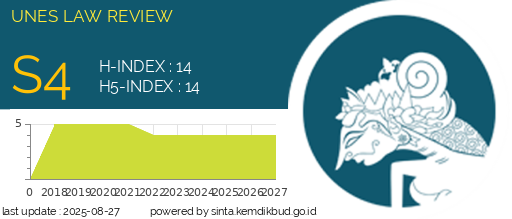Kajian Hukum Waris Islam Tentang Diyat Korban Meninggal Dunia Terhadap Ahli Waris Korban
DOI:
https://doi.org/10.31933/unesrev.v6i3.1773Keywords:
Islamic Inheritance, Diyat, Criminal LawAbstract
The criminal law paradigm has begun to change since the emergence of the new Criminal Code (KUHP), where criminal punishment is emphasized not only as retaliation but also as recovery. Diyat punishment is one solution to restore victims. By giving property to the victim, you can make the victim's life easier financially. However, it is different from the diyat punishment for perpetrators of murder, not torture, which in this case has a perspective from the view of Islamic inheritance law. How is the diyat punishment given to the victim who is the heir of the murder victim from the perspective of Islamic inheritance law? This research uses normative legal research methods, namely by examining legal norms regarding diyat punishment from the perspective of Islamic inheritance law. Meanwhile, this research approach uses a statutory approach and a case approach related to diyat punishment. The results of research into the diyat punishment which should be the victim's right will be transferred to the victim's heirs considering that the victim has died as a result of murder. The concept of diyat punishment from the perspective of Islamic inheritance law is one of the appropriate solutions and is in accordance with the principles of the new Criminal Code.
Downloads
References
Dja’far, Moh., Polemik Hukum Waris. Jakarata: Kencana Mas Publishing House, 2007.
Makhrus Munajat, Fiqh Jinayat, (Yogyakarta : pesantren Nawasea press, 2010)
Muchammad Ichsan dan M. Endrio Susilo, Hukum Pidana Islam Sebuah Alternatif, (Yogyakarta : LabHukum fakultas Hukum UMY, 2006)
Peter Mahmud Marzuki, Penelitian Hukum (Cetakan ke-9), Jakarta, KENCANA, 2014
Rafiq, A, Fiqh Mawaris Cetakan Keempat. Jakarta: PT RajaGrafindo Persada, 2002
Rohidin, Pengantar Hukum Islam dari Semenanjung Arabia Sampai Indonesia. Yogyakarta: Lintang Rasi Aksara Books, 2016.
Rusli Muhammad, Pembaharuan Hukum Pidana Indonesia, UII Press, Yogyakarta, 2019.
Said, Hasani Ahmad. Studi Islam I Kajian Islam Kontemporer. Jakarta: PT Raja Grafindo Persada. 2016.
Suparman, Eman, Hukum Waris Indonesia dalam Perspektif Islam, adat, dan BW. Bandung: PT. Refika Aditama, 2014
Downloads
Published
How to Cite
Issue
Section
License
Hak cipta :
Penulis yang mempublikasikan manuskripnya di jurnal ini menyetujui ketentuan berikut:
- Hak cipta pada setiap artikel adalah milik penulis.
- Penulis mengakui bahwa UNES Law Review berhak menjadi yang pertama menerbitkan dengan lisensi Creative Commons Attribution 4.0 International (Attribution 4.0 International CC BY 4.0) .
- Penulis dapat mengirimkan artikel secara terpisah, mengatur distribusi non-eksklusif manuskrip yang telah diterbitkan dalam jurnal ini ke versi lain (misalnya, dikirim ke repositori institusi penulis, publikasi ke dalam buku, dll.), dengan mengakui bahwa manuskrip telah diterbitkan pertama kali di Jurnal UNES Law Review.


















